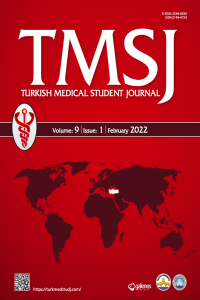FEAR OF COVID-19 AMONG MEDICAL STUDENTS AND ASSOCIATED FACTORS
FEAR OF COVID-19 AMONG MEDICAL STUDENTS AND ASSOCIATED FACTORS
COVID-19 medical students, fear, distance education, medical education,
___
- 1. Nguyen HT, Do BN, Pham KM et al. Fear of COVID-19 scale-associations of its scores with health literacy and health-related behaviors among medical students. Int J Environ Res Public Health 2020;17(11):4164.
- 2. TzurBitan D, Grossman-Giron A, Bloch Y et al. Fear of COVID-19 scale: Psycho- metric characteristics, reliability and validity in the Israeli population. Psychiatry Res 2020; 289:113100.
- 3. World Health Organization (WHO). COVID-19 weekly epidemiological update. WHO: Geneva, Switzerland, 2020. Available from: URL: https://www.who.int/publications/m/item/weekly-epidemiological-update---22-december-2020.
- 4. Du Z, Xu X, Wang L et al. Effects of proactive social distancing on COVID-19 outbreaks in 58 cities, China. Emerg Infect Dis 2020;26(9):2267-9.
- 5. Demirbilek Y, Pehlivanturk G, Ozguler ZO et al. COVID-19 out-break control, example of ministry of health of Turkey. Turk J Med Sci 2020;50:489-94.
- 6. Mei SL, Yu JX, He BW et al. Psychological investigation of university students in a university in Jilin province. Med Soc 2011;24(05):84-6.
- 7. Li WW, Yu H, Miller DJ et al. Novelty seeking and mental health in Chinese uni- versity students before, during, and after the COVID-19 pandemic lockdown: A longitudinal study. Front Psychol 2020;11:600739.
- 8. Cao W, Fang Z, Hou G et al. The psychological impact of the COVID-19 epidemic on college students in China. Psychiatry Res 2020;287:112934.
- 9. Ahorsu DK, Lin CY, Imani V et al. The fear of COVID-19 Scale: Development and initial validation. Int J Ment Health Addict 2020;1-9.
- 10. Ladikli N, Bahadir E, Yumusak FN et al. The reliability and validity of Turkish version of coronavirus anxiety scale. Int J Soc Sci Res 2020;3(2):71-80.
- 11. Turkish Ministry of Health. COVID-19 daily and weekly epidemiological up- dates: Ankara, Turkey, 2020. Available from: URL: https://covid19.saglik.gov.tr/ TR-68443/covid-19-durum-raporu.html.
- 12. Haktanir A, Seki T, Dilmaç B. Adaptation and evaluation of Turkish version of the fear of COVID-19 scale. Death Studies 2020. Available from: URL: https://doi.org /10.1080/07481187.2020.1773026.
- 13. American Psychiatric Association. Diagnostic and statistical manual of mental disorders 5th ed. Washington DC: American Psychiatric Association; 2013.p.189
- 14. Centers for Disease Control and Prevention (CDC). Older adults and COVID-19: Atlanta, Georgia, USA, 2020. Available from: URL: https://www.cdc.gov/corona- virus/2019-ncov/need-extra-precautions/older-adults.html.
- 15. Martinez-Lorca M, Martinez-Lorca A, Criado-Alvarez JJ et al. The fear of COVID-19 scale: Validation in Spanish university students. Psychiatry Res 2020;293:113350.
- ISSN: 2148-4724
- Başlangıç: 2014
- Yayıncı: Trakya Üniversitesi
Mustafa Ömer İZZETTİNOĞLU, Rüveyde GARİP
BODY DYSMORPHIC DISORDER: A COMPREHENSIVE REVIEW
Farheen MALİK, Jawad AHMED, Sundus NASİM, Aiman ALİ, Ahmad Rehan KHAN
Nisanur KAYGISIZ, Atahan DURBAŞ, Hüseyin KARAMAN, Çağla Hamide SOLMAN, Özdal ERSOY
FEAR OF COVID-19 AMONG MEDICAL STUDENTS AND ASSOCIATED FACTORS
Berfin TAN, Beril AY, Janset ÖZDEMİR, Okan ÇALIYURT
MANAGEMENT OF A T-TUBE MIGRATION INTO THE SYRINX CAVITY: A CASE REPORT
Ceren YILMAZ, Erkan SEBİCİ, Mert Yücel AYRIK, Ahmet Hamit ÇINKI, Ahmet Tolgay AKINCI
SQUAMOUS CELL CARCINOMA OF THE CAUDAL NASAL SEPTUM AND THE NASAL VESTIBULE: A CASE REPORT
Berfin TAN, Elif CENGİZ, Berra KURTOĞLU, Elif ÇALIŞKAN, Kemal KEF
INCIDENTAL DETECTION OF PREVIOUSLY UNKNOWN BREAST CANCER ON Tc-99m MIBI SCINTIGRAPHY
Nur Gülce İŞKAN, Şeyma Gizem ORUN, Ezgi GÖKDEMİR, Gülay Durmuş ALTUN
Fatih Erkan AKAY, Beliz KOÇYİĞİT, Fevzi Oktay ŞİŞMAN, Mert Yücel AYRIK, İpek SAVAŞIR, Elif CENGİZ, Ufuk DEMİRCİ, Hakkı Onur KIRKIZLAR
Muhammad Romail MANAN, Hamna MANAN
CASE REPORT OF AN INCIDENTAL UNICENTRIC CASTLEMAN DISEASE
Elif CENGİZ, Alperen Taha CERTEL, Mert Yücel AYRIK, Mehmet Gürkan ARIKAN, Elif MERCAN, Fulya ÖZ PUYAN, İrfan Hüseyin ATAKAN
